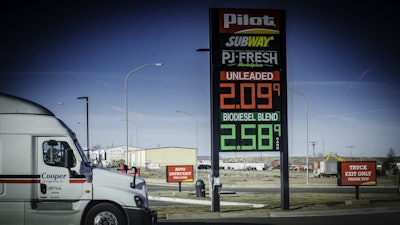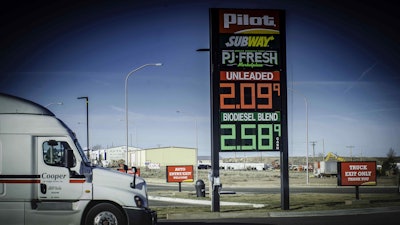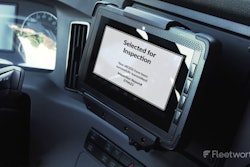
 A conference committee in the Ohio legislature will likely be tasked with finding middle ground with the House and Senate on a fuel tax hike.
A conference committee in the Ohio legislature will likely be tasked with finding middle ground with the House and Senate on a fuel tax hike.Owner-operators Scott Reed and Todd Campbell took to the Ohio Senate on Tuesday morning to testify against a planned fuel tax hike in the state, and though the state’s Senate is advancing a bill to increase per-gallon diesel taxes, they may have been successful in warding off a larger increase.
An Ohio Senate committee on Thursday cleared legislation to raise per-gallon taxes on diesel and gasoline 6 cents a gallon, which would put total state taxes at 34 cents for both diesel and gas. That 6-cent increase is only a third of the 18-cent increase requested by Ohio Gov. Mike DeWine and well less than the 20-cent-per-mile increase for diesel proposed in the state’s House.
Reed and Campbell, testifying on behalf of a few trucker advocacy groups Tuesday, said they urged lawmakers in the Ohio Senate to hold fuel tax rates at their current 28-cent per-gallon level. Given that nearly all states that border Ohio have instituted diesel tax increases of late, truckers and motorists would be more apt to purchase fuel in Ohio, they argued, thus providing the state with a boost in infrastructure funding via volume of sales, rather than on a per-gallon tax increase.
They contend the state’s recent issues with borrowing money for infrastructure shouldn’t equate to higher fuel taxes to help right the ship.

The Ohio Trucking Association, however, favors the increase. If lawmakers don’t raise fuel taxes, they’ll look to other avenues, such as tolls, increased registration fees and other more burdensome costs to trucking, says Tom Balzer, president of OTA.
“Ohio is kind of in a crisis right now from a funding standpoint,” says Balzer. The state has tried to “stretch its dollars,” he said, “but it’s time to take a look at how we fund future revenues. What we have said is, if you are going to increase fees, our preference would be fuel taxes…because we can recoup some of these costs through fuel surcharges.”
OTA also prefers fuel taxes to other funding mechanisms, says Balzer, because there’s an amendment in the Ohio state constitution that requires fuel taxes to be spent on road and bridge projects.
Reed says he and Campbell did an informal survey of carriers in the state, calling more than 240 of them total. Of those, 91 percent “came back against” a fuel tax increase, says Reed. They phoned carriers ranging in size from one truck to upwards of 100, they said.
Though they mostly oppose any increase in fuel taxes, “we could live with a 10-cent increase,” says Campbell. A larger increase, such as the 20-cent option offered by the Ohio House, “would be devastating to small business owners” in the state, said Reed.
Reed, a former owner-operator who plans to return to trucking, heads the TruckSmart Solutions group and is based in Buckland, Ohio. Campbell, owner-operator of Campbell Trucking, is based in Bainbridge, Ohio. The pair last month spearheaded the “slow roll” protests that took place mostly along I-70 in Ohio and around Columbus, the state’s capitol. In part, they protested the planned fuel tax hikes, among other issues, such as parking, hours of service and ELDs.












